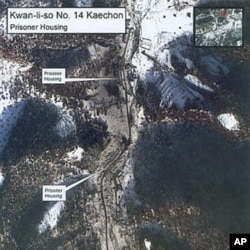A human rights group is beginning to build the case for the eventual prosecution of Kim Jong Un and other North Korean leaders for crimes against humanity by detailing information about thousands of individuals who have been sent to political prison camps.
The Database Center for North Korean Human Rights (NKDB) has published a list of political prison detainees, staff and victims of enforced disappearance, including names, dates of incarceration, alleged crimes and the locations of camps still in operation.
“By providing specific information on individual perpetrators we can show them that they are responsible for their actions in the event of an opening up in North Korea,” said Kim In-sung, a researcher at NKDB.
Evidence
The catalogue was based on surveys and interviews with more than 1,000 North Korean defectors. It is intended to provide further evidence to support the 2014 United Nations Commission of Inquiry investigative report documenting a network of political prison camps in the country and widespread atrocities, comparable to what the Nazis did before and during World War II.
The U.N. General Assembly subsequently voted to refer North Korea to the International Criminal Court on charges of crimes against humanity. The measure stalled, however, in the U.N. Security Council where North Korean allies Russia and China use their vetoes.
North Korea has repeatedly denied the existence of prison camps in the country.
After the U.N. report was issued, Kim Song, an official with the Democratic People's Republic of Korea's mission to the United Nations called the accusations of atrocities "groundless," and called the defectors who testified “human scum.”
Locations
NKDB lists the location of four prison camps currently operating in North Korea, but says there could be other camps they do not know about.
Camp 15 in Yodeok and camp 14 in Gaecheon are near the capital, Pyongyang. Camp 16 in Hwaseong and camp 25 in Cheongjin are located closer to Russia in the northeast of the country.
NKDB says the existence of these camps, as well as an estimated over 100,000 political prisoners being detained at these locations, has been confirmed by satellite images.
The group has also documented a number of other prison camps that are no longer in operation.
Crimes
The list of crimes detainees were charged with includes criticizing the state, religious activity, attempting to escape to South Korea, listening to foreign radio and attempting contact with South Koreans.
The extensive list of detainees in some cases dates back decades.
In 1970, Kim Gang Cheol was allegedly sent to camp 15 on the charge of guilt by association in connection with his older brother who was sent to a prison camp for voicing complaints against the government.
The severe famines of the 1990s and early 2000s that killed more than 3 million North Koreans saw an increase in arrests of families trying to escape to South Korea in search of basic human needs.
In 2004, the children of Kim Jae Hun were sent to prison camp 16 for attempting to leave the country, according to the NKDB.
Many North Koreans are still being arrested for attempting to escape, but NKDB says most are now looking more for better economic opportunities and political freedom.
“Recently, there are people who escape because they are not content with the political system, or they oppose the political system, or they would like to have more freedom in their lives,” said Lim Soon-hee, the NKDB’s chief of planning and management.
The NKDB noted that in 2010, Kim Hui Seon was arrested for attempting to cross into China with his entire family.
Conditions
Increased international scrutiny of the North Korea human rights situation, the NKDB says, may have prompted the Kim Jong Un government to close some prison camps in recent years.
But conditions inside the camps still in operation, human rights advocates say, have not improved.
The U.N. report documented systematic abuse at North Korean prison camps that include extrajudicial killings, enforced disappearances, arbitrary arrests, beatings, forced starvation, sexual assault, forced labor and torture.
Youmi Kim in Seoul contributed to this report.






